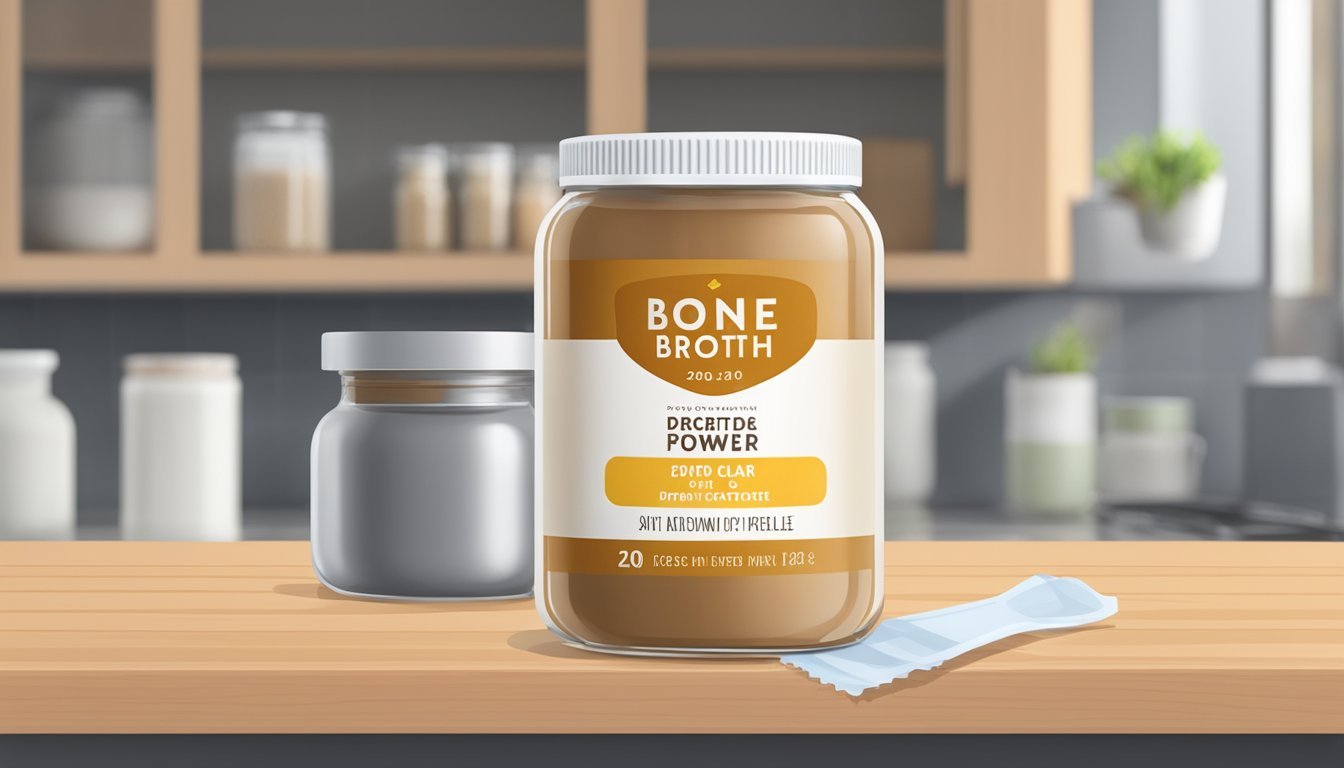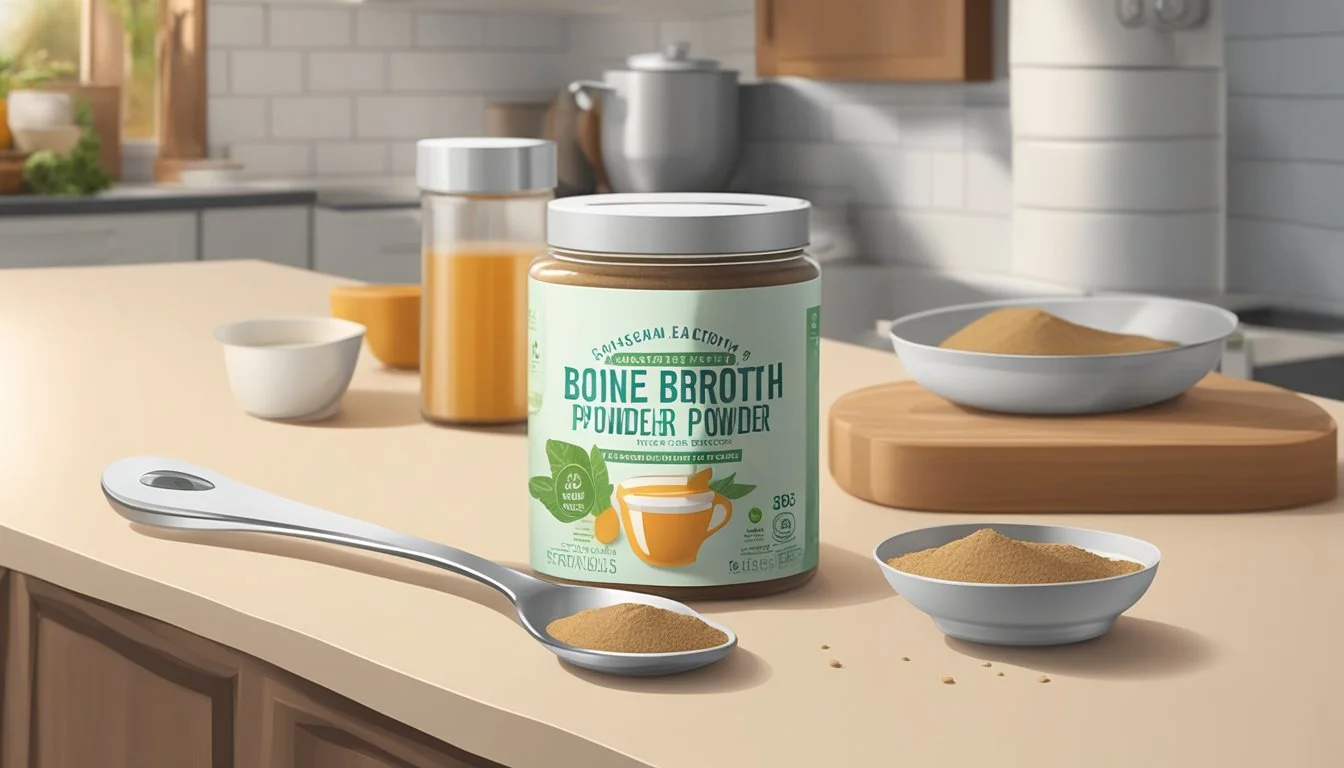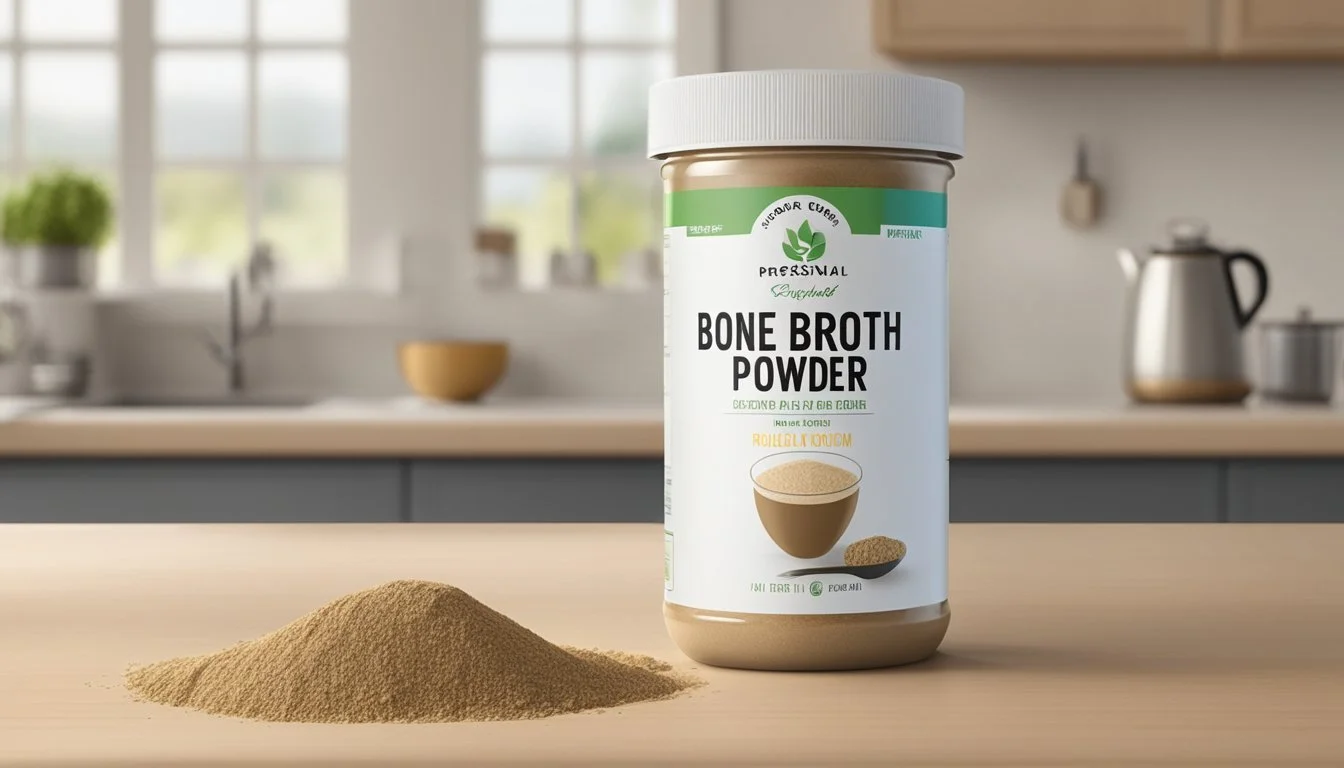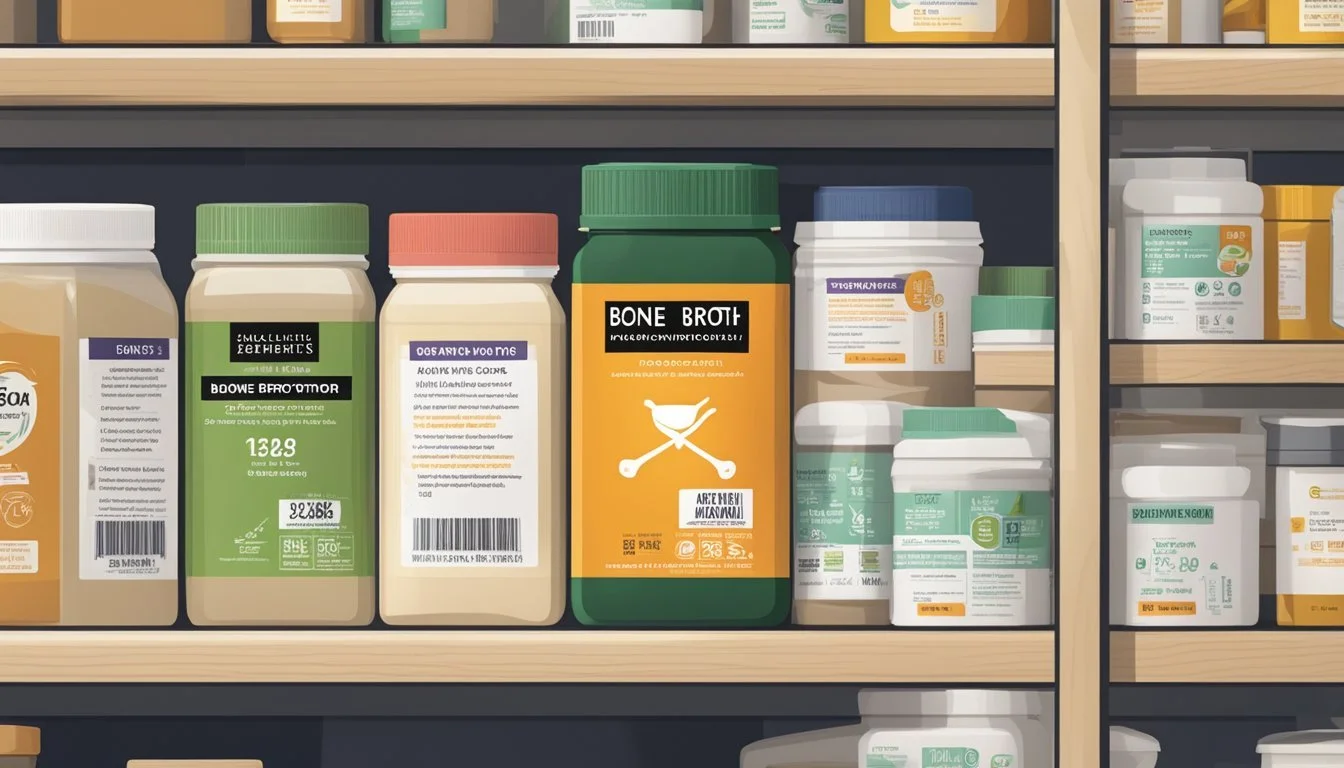Does Bone Broth Powder Expire?
Shelf Life and Storage Tips
Bone broth powder has emerged as a popular dietary supplement, leveraging the nutrients of traditional bone broth in a convenient, shelf-stable form. It does have an expiration date, typically around two years from the manufacture date if unopened. Once opened, however, the quality and freshness might degrade in about 4 to 6 months, depending on storage methods.
Proper storage is crucial to extending the life of bone broth powder. Keeping it in a cool, dry place and ensuring the container is tightly sealed can help maintain its potency. Signs that bone broth powder has expired include a change in smell, taste, or texture, indicating it's no longer safe for consumption.
When using bone broth powder as part of a health routine, paying attention to these details ensures the best possible experience. By being mindful of expiration dates and storage practices, users can continue to enjoy the benefits of this nutrient-packed supplement safely.
Understanding Bone Broth Powder
Bone broth powder is a dehydrated form of bone broth, providing a concentrated source of nutrients with various health benefits. This section delves into the nutritional profile and health benefits of bone broth powder.
Nutritional Profile
Bone broth powder is rich in collagen and gelatin, essential components for skin, hair, and nail health. It contains a good amount of protein, which is crucial for muscle repair and growth.
Minerals such as calcium, magnesium, and potassium are present in bone broth powder, supporting bone health and electrolyte balance. Amino acids like glycine and proline, which are not found in significant amounts in other protein sources, also play vital roles in maintaining healthy tissues.
Health Benefits
Bone broth powder offers numerous health benefits, particularly for gut health and joint health. The gelatin in bone broth helps to repair the gut lining, aiding in digestion and reducing inflammation.
For joints, the collagen content supports the maintenance and regeneration of cartilage, which is crucial for reducing joint pain and improving mobility. Furthermore, the amino acids found in bone broth powder help to reduce inflammation and support the immune system, promoting overall wellness.
In addition, the high protein content in bone broth powder makes it a valuable supplement for those looking to increase their protein intake without excessive calories, thereby aiding in weight management and muscle building.
Expiration Date of Bone Broth Powder
Bone broth protein powder has a defined shelf life that varies based on storage conditions and packaging integrity. Key factors include reading labels for expiration dates and understanding what influences the longevity of the product.
Reading Labels and Understanding Dates
Bone broth powder typically includes an expiration date on its packaging. This date indicates when the product may start losing its nutritional value. The shelf life of bone broth powder generally ranges from six to 24 months.
Labels often provide two important dates:
Package Date: When the product was manufactured.
Best Before Date: Suggested date for optimal quality.
It's crucial to check these dates and store the powder in a cool, dry place. Proper storage can extend the quality beyond the indicated expiration date, but it's always best to err on the side of caution.
Factors Affecting Expiration
Several factors can impact the expiration of bone broth powder:
Storage Conditions:
Temperature: High temperatures can reduce shelf-life.
Humidity: Keeps the product dry to prevent spoilage.
Packaging Integrity:
Sealed Containers: Unopened packages last longer.
Opened Packages: Once opened, consume within four to six months for best quality.
Contaminated packaging or compromising the seal can accelerate spoilage. Always inspect the product for any signs of spoilage, such as a foul smell or unusual taste, before consumption.
By paying attention to these details, one can ensure the bone broth powder remains fresh and nutritionally beneficial for as long as possible.
Signs of Spoilage in Bone Broth Powder
Bone broth powder can show various signs of spoilage. Recognizing these signs early can prevent consumption of spoiled products, ensuring safety and maintaining quality.
Visual Indicators of Spoilage
Visual cues are often the first signs that bone broth powder has spoiled. One key indicator is a change in color. The powder should maintain a consistent color, typically ranging from off-white to light brown. If it appears darker or displays unusual hues, it may no longer be safe to use.
Cloudiness in the powder, when mixed with water, can signal spoilage. Fresh bone broth powder should dissolve clearly. If the mixture seems murky or contains clumps, it is likely degraded.
Any sign of mold growth on the surface indicates contamination. Mold spores can appear as green, black, or white spots. Presence of any such features necessitates immediate disposal of the product.
Olfactory Indicators of Spoilage
Odor plays a crucial role in identifying spoiled bone broth powder. Fresh powder should emit a subtle, neutral, or slightly savory scent. A sour, musty, or otherwise unpleasant smell is a strong sign of spoilage.
Consistent with the theme of spoilage, the taste can be an indicator as well. While it is not advised to consume potentially spoiled products, a strong off-taste when dissolved suggests that the powder has gone bad.
Changes in texture and consistency are also telling signs. The powder should maintain a fine, dry texture. If it becomes clumpy or sticky, it is possibly exposed to moisture and degradation.
By paying attention to these signs, you can ensure that bone broth powder remains safe and effective for consumption.
Proper Storage Techniques
Proper storage techniques for bone broth powder involve keeping it in the pantry, refrigerator, and freezer to extend its shelf life and maintain its quality. Ensure the use of airtight containers and control temperature and humidity levels.
Storing in Pantry
When keeping bone broth powder in the pantry, use airtight containers to protect it from moisture and light. Cool and dry environments are vital, as heat can cause degradation. Avoid exposure to direct sunlight, which can reduce its potency. Ideally, place the containers on a shelf away from the stove and windows.
Store-bought bone broth powder typically includes preservatives that aid in longer shelf life compared to homemade versions, but both benefit from these storage tips. Monitor the storage area for humidity control, particularly during the summer months, to further protect the product.
Storing in Refrigerator
For short-term storage, refrigeration can help extend the life of bone broth powder. Transfer the powder to an airtight container before placing it in the fridge. This method is particularly beneficial for those living in humid climates where moisture control can be challenging.
Although bone broth powder itself has low moisture, the refrigerator’s cool environment helps ensure any ambient moisture doesn't affect the powder. Store-bought powders typically include guidelines indicating how long they can be refrigerated, often extending few weeks. Always check the powder for any changes in texture or smell before use.
Freezing for Longevity
Freezing bone broth powder is an excellent method for long-term storage. Portion the powder into small, airtight containers to facilitate easy thawing and minimize exposure to air. Label each container with the date to track storage duration.
Freezing helps maintain the powder's nutritional value and prevents spoilage. When ready to use, thaw only the required portion to avoid repeated freezing and thawing, which can affect quality. Ensure the freezer temperature remains consistent to prevent any potential degradation. Both homemade and store-bought powders benefit significantly from this storage method, retaining freshness for several months.
Safety and Health Implications
Ensuring the safety of bone broth protein powder is essential to avoid health risks. Consuming spoiled bone broth powder can lead to food poisoning and other adverse effects, so proper storage and handling are crucial.
Risks of Consuming Spoiled Bone Broth
Spoiled bone broth powder can contain harmful bacteria, which may lead to food poisoning. Symptoms of food poisoning include nausea, vomiting, diarrhea, and abdominal pain.
Bacterial growth is a significant concern once the powder is compromised, either by exposure to moisture or temperature fluctuations. If the powder has an off smell, taste, or appearance, it should not be consumed.
Consuming spoiled bone broth can weaken the immune system and lead to more severe health risks, especially in vulnerable populations such as the elderly and those with compromised immune systems. Preventative Measures
To minimize risks, bone broth powder should be stored in a cool, dry place, in a tightly sealed container. Refrigeration can extend its shelf life, thwarting bacterial growth and keeping the product safe to consume.
After opening, it's best to use the powder within the timeframe recommended by the manufacturer. Always check for signs of spoilage before consumption, such as changes in smell or appearance.
Label containers with the opening date to keep track of how long the product has been stored. Regularly inspecting the packaging for signs of damage can prevent accidental consumption of compromised powder.
Reviving and Reusing Expired Bone Broth Powder
Expired bone broth powder, if recently expired, can still be utilized if tested carefully for safety. In the kitchen, it can be a valuable ingredient when used in creative recipes.
Testing for Possible Rescue
Before using expired bone broth powder, conduct a few simple tests to ensure it’s still safe. First, check the smell. Fresh powder has a distinct, savory aroma, whereas expired powder may smell off.
Next, inspect the appearance for signs of clumping or discoloration. clumps or a change in color indicate moisture intrusion and potential spoilage.
Give it a taste test. A small amount mixed with hot water should not taste sour or unusually bitter. If any test fails, discard the powder immediately. Remember: Safety first. Never compromise well-being for cost-saving.
Incorporating into Recipes
When deemed safe, expired bone broth powder can enhance various dishes. It can be added to soups, stews, or sauces for a nutritional boost. Mixing with hot water creates a savory base for cooking grains like rice or quinoa.
Use it to season roasted vegetables or meats. The powder can also be incorporated into marinades, offering a depth of flavor.
For creative culinary experiments, it can be blended into smoothies or protein shakes. Caution: Expired powders might lack full potency, so adjust the quantity to achieve desired taste.
Frequently Asked Questions
Does bone broth powder expire?
Yes, bone broth powder does expire. Look for the expiration date on the packaging. Manufacturers typically provide this date based on optimal freshness.
How long does bone broth powder last after opening?
Once opened, bone broth powder should be consumed within a few months. Store it in a cool, dry place to extend its shelf life.
Can expired bone broth powder be used?
Using expired bone broth powder is not recommended. It may lose its potency, flavor, and nutritional benefits. Check for any signs of spoilage, such as unusual smell or clumping.
What are the storage recommendations for bone broth powder?
For best results, store bone broth powder in an airtight container. Keep it in a cool, dry place away from direct sunlight and moisture.
Is there a difference in shelf life between different brands?
There can be variations in shelf life depending on the brand and ingredients used. Always refer to the packaging for specific information.
How can you tell if bone broth powder has gone bad?
Signs of spoilage include a sour smell, discoloration, and clumping. If any of these are present, it's best to discard the powder.
What is the shelf life of unopened bone broth powder?
Unopened bone broth powder can last anywhere from 12 to 24 months. Always check the expiration date provided by the manufacturer.
Are there any additional considerations for homemade bone broth powder?
Homemade bone broth powder may not contain preservatives that extend shelf life. Proper storage is crucial to maintain its quality and safety.









